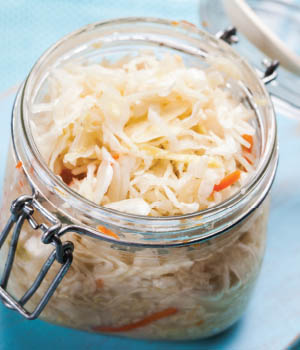Cultured taste
This article was originally published in March 2015

Cultured foods are having a moment. From artisan sauerkrauts to cultured cottage cheese to kombucha, eaters can’t seem to get enough of foods teeming with good bacteria. These bacteria, called probiotics, assist with normal digestion and benefit our immune system, warding off colds and even boosting our mood.
Probiotics can be identified by their specific strain, such as acidophilus or rhamnosus. Dozens of different strains of bacteria have been identified, and often they are listed on a label as colony-forming units (CFUs), the number of bacterial cells estimated to colonize the GI tract per serving.
There’s no established recommendation for our daily intake of probiotics, but regular consumption is a good idea. Experts say it’s best to consume a variety of bacterial strains — so choose a mix of probiotic-rich fermented and cultured foods and supplements at PCC.
Probiotic-rich foods
Yogurt — PCC’s entire selection features live active cultures, without the high-fructose corn syrup and artificial flavors you’ll find in conventional brands. On average, yogurt has about 50 million CFUs of good bacteria. Choose from yogurt made from the milk of cows, sheep, goats, coconuts, almonds, soybeans or rice, from a variety of producers.
Fermented vegetables — If you’re skeptical you’ll like fermented vegetables, try Firefly Kitchens’ completely raw, vegan and naturally preserved foods made without heat or preservatives. Seattle-based Firefly’s Yin-Yang Carrots are loved even by people who don’t like traditional sauerkraut. The kimchi, based on the classic Korean-style fermented cabbage with ginger, garlic and spice for a spicy kick, also is not to be missed.
Looking for a more traditional sauerkraut? Try OlyKraut, made in Olympia with mostly local, organic ingredients. Standout flavors include Original, Eastern European, Curry and Fire Chi. Available in select stores.
Britt’s Pickles — Most conventional pickles are processed using vinegar and calcium chloride, cooked under extreme heat and then pasteurized. This may cause the cucumbers to lose most of their vitamin C and enzymes and kill off the healthy bacteria. Not Britt’s! Britt’s vegetables are fermented in oak barrels and suffused in brine for up to three weeks, resulting in raw, live, cultured pickles.
Miso — Salty-sweet and deliciously savory, miso is a flavorful paste made of fermented soybeans and grain, such as rice or barley. It traditionally is used in Japanese cooking but also can add a twist to many non-Asian soups (add it after soup has cooked), dips, marinades and more.
Tempeh — Tempeh often is considered the “meatiest” of soy foods and the most versatile for cooking. It’s high in protein and fiber, low in fat and has zero cholesterol. It keeps its shape well and easily takes on flavors of marinades or companion ingredients. Read our tempeh brochure.
Cultured cottage cheese and butter — Try Nancy’s organic, low-fat cottage cheese, fully cultured for a unique old-fashioned tangy flavor. Jacobs Creamery makes cultured butter with cream from pastured cows.
Probiotic-rich drinks
Kefir — Kefir is similar to yogurt but consumed in a drinkable form instead of with a spoon. It’s fermented for a longer time than yogurt and with a greater variety of bacterial species, resulting in much greater probiotic support than yogurt provides (an average of 1 to 10 billion CFUs, compared with yogurt’s 50 million). It’s also more absorbable and may be suitable for people with lactose intolerance. Try low-fat kefir from Nancy’s or Wallaby, local whole-milk kefir from Grace Harbor Farm, or goat milk kefir from Redwood Hills.
Kombucha — With a sharp flavor many people liken to vinegar, kombucha initially can be a bit of a shock to the tastebuds. But it’s a taste that seems to grow quickly on those who try it. Kombucha is a living symbiotic colony of beneficial microorganisms including yeast and bacteria.
When added to tea (such as green or black) and sugar and allowed to ferment, an elixir of vitamins, minerals, enzymes and health-giving organic acids forms. Kombucha is naturally effervescent and available in a wide variety of flavors.
Supplements
- Inner-co Fresh Coconut Water Probiotic — Handcrafted in small batches using freshly harvested coconut water from young green coconuts, with zero additives. Each serving contains 100 billion active probiotic cultures.
- Garden of Life RAW Probiotic Ultimate Care — Boost your immune health with one capsule daily and get 100 billion active cultures! Each pill contains more than 30 probiotic strains and provides protein-digesting enzymes for added digestive support.
- PCC Multi Flora — If you’re looking for billions of bacteria at a good price, consider PCC’s own formula with five different beneficial bacterial strains in each capsule.
